Eye Surgery
Specialised eye surgery in Devon
At the forefront of eye care in the United Kingdom, our ZEISS Cataract Suite is a state-of-the-art facility dedicated solely to the treatment and management of cataracts. Our advanced technology allows our experienced surgeons to perform quick and accurate intraocular lens (IOL) implantations.
Beyond cataract surgery, The Medical Eye Clinic also provides comprehensive care for a range of eye conditions, including glaucoma and age-related macular degeneration. From your first consultation to the final stages of your treatment, we are committed to delivering a high-quality, patient-centred experience every step of the way.
The Medical Eye Clinic Offers Expert Eye Surgery
At The Medical Eye Clinic Exeter, we understand just how vital clear vision is to your overall health and quality of life. Good eyesight lets us truly enjoy the world, filled with its vivid colours and stunning sights. We know firsthand how much vision matters, especially when faced with challenges like visual impairments. Our clinic is passionate about improving eye care in the Devon area. We pride ourselves on our expert team, which includes highly trained ophthalmologists and optometrists. In partnership with Bill Opticians, a leading name in the Southwest, we are dedicated to delivering top-notch and innovative eye care services.
Whether you need specialised treatments, comprehensive eye exams, contact lenses, or new glasses, we’re here to provide you with professional and attentive service. What sets us apart is our holistic approach, bringing together a range of eye care specialists all in one location.
This creates a smooth and efficient experience for our patients, where personalised care and excellent clinical results are our top priorities. With the latest technology and diagnostic tools at our disposal, we ensure that every eye examination and procedure is thorough and tailored to meet your specific needs.
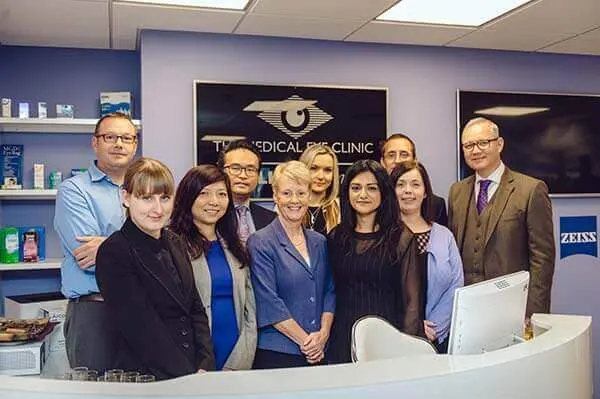
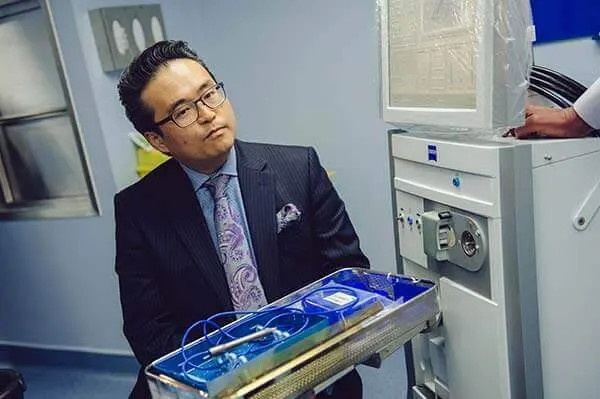
Our Eye Surgeries at The Medical Eye Clinic Exeter
Welcome to our ZEISS Cataract Suite in the UK, a premier facility focused exclusively on advanced cataract treatment. Equipped with the latest technology, our experienced surgeons are skilled at quickly and precisely implanting intraocular lenses (IOL).
In addition to cataract surgeries, we also specialise in treating various eye conditions, such as glaucoma and age-related macular degeneration. From your first consultation to the successful completion of your procedure, we are dedicated to delivering exceptional care and thorough service that aims to surpass your expectations.
- Cataracts
- Diabetic Macular Oedema
- Glaucoma
- Wet Macular Degeneration
- Refractive Errors
Cataracts eye surgery
What are cataracts?
Cataract surgery has emerged as a popular and effective treatment for those dealing with the challenges posed by cataracts. This condition is marked by a clouding of the eye’s lens, which can severely hinder vision. Choosing to undergo private cataract surgery in Devon comes with several advantages, drawing many patients in search of a dependable solution.
Cataracts are a common eye issue that causes the normally clear lens to become cloudy, leading to a significant decline in visual clarity. Typically, this lens is a clear disc that allows for sharp vision, but cataracts interfere with this clarity. Over time, these cloudy areas can grow larger, potentially resulting in complete vision loss.
While cataracts usually affect both eyes, they can also develop in just one eye or be more pronounced in one than the other. The primary cause of cataracts is the gradual breakdown of lens tissues, which leads to the accumulation of protein clusters that obscure certain parts of the lens.
Cataract treatment
Currently, there are no effective medical treatments available to slow down or prevent cataracts from worsening. Nevertheless, a viable solution exists: replacing the cloudy natural lens with an artificial intraocular lens. This procedure not only significantly improves vision but also enhances the overall quality of life for many individuals.
Cataract surgery is recognised globally as one of the most commonly performed and safest surgical procedures. During the operation, experienced surgeons carefully remove the cloudy lens and create a small incision at the edge of the eye to insert the new lens. A notable feature of this procedure is that the incision typically heals on its own, which means stitches aren’t required, leading to a smooth recovery. The surgery itself usually lasts between 15 and 30 minutes, and with the use of anaesthesia, patients feel no discomfort at all during the process.
Diabetic macular eye surgery
What is diabetic macular?
The retina acts like a film layer at the back of your eye, playing a crucial role in vision. At its centre is the macula, responsible for perceiving vivid colours and fine details. Unfortunately, diabetes can severely impact the tiny blood vessels in this area, including the macula’s.
When these vessels are damaged by ongoing high blood sugar levels, they start to leak fluid and proteins, leading to swelling. This condition is known as diabetic macular oedema (DMO), and it can significantly affect your sight.
What treatments are available for DMO?
As DMO is effectively the manifestation of diabetes in the eye, the treatment for DMO includes optimising the following system risk factors:
- Improve the control of diabetes
- Improve the control of blood pressure
- Improve the control of ‘lipid profile.’
In addition to these systemic measures, the following ‘eye-specific’ treatments can be used to treat DMO:
Laser treatment. This is the conventional treatment for DMO, useful for treating DMO that does not directly involve the central vision. However, when DMO is very close to or involves the very centre of the macula, laser treatment can have the undesired effect of producing scarring in the central vision.
Pharmacological treatment by intravitreal therapy This is when medication is injected into the main eye cavity, the vitreous, to treat DMO. This is the modern treatment that is preferable in most cases of DMO, especially when DMO is very close to or involves the central vision.
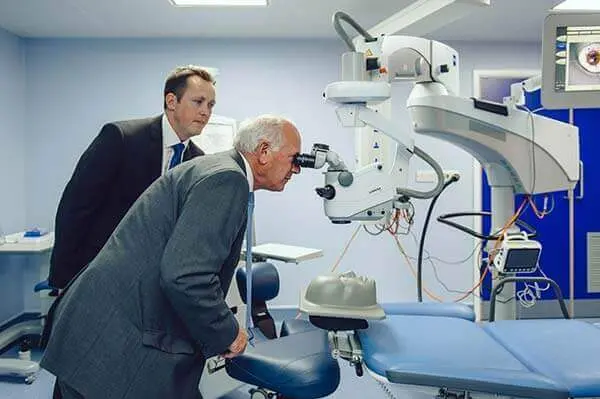
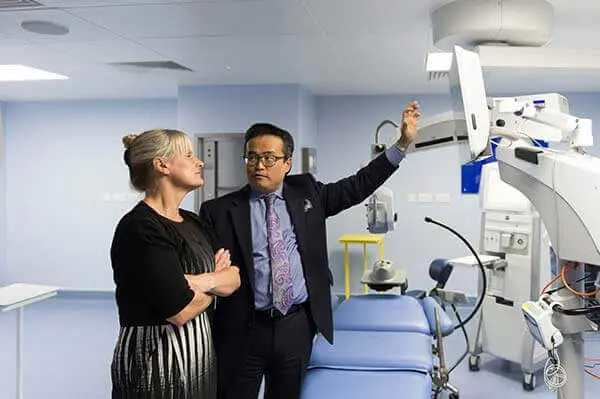

Glaucoma eye surgery
What is glaucoma?
Glaucoma is a group of eye disorders that usually involve increased pressure inside the eye. This rise in intraocular pressure (IOP) can harm the optic nerve, resulting in a gradual decline in peripheral vision. Treatment options for glaucoma vary based on the specific type of the condition. One of the most alarming features of glaucoma is that it often doesn’t present any obvious symptoms; many people experience no pain or noticeable changes in their vision.
As a result, they may not realise there’s an issue until they’ve lost a significant portion of their peripheral sight. The Medical Eye Clinic is a trusted facility with a skilled team of ophthalmologists and optometrists dedicated to providing thorough care for glaucoma patients.
Glaucoma Treatment
Effectively managing glaucoma is a lifelong commitment, necessitating regular monitoring and ongoing treatment. Here at the esteemed Medical Eye Clinic in Exeter, we proudly provide an array of specialised treatments, each meticulously crafted to effectively lower intraocular pressure (IOP), the sole approach to effectively managing this condition.
Our dedicated glaucoma consultant will work closely with you to create a personalised treatment plan that caters specifically to your unique needs.
Glaucoma Eye Drops
In the past, glaucoma eye drops have typically been the primary option for treatment, proving to be highly effective. It is necessary to administer these drops regularly, often on a daily basis. However, not everyone feels comfortable with the daily routine of instilling eye drops, and certain medical conditions may make them unsuitable for glaucoma eye care drops.
Thankfully, The Medical Eye Clinic offers alternative treatments alongside drops, ensuring comprehensive care for patients.
LASER TREATMENT: Selective Laser Trabeculoplasty, or SLT
SLT is a straightforward and safe option that provides effective relief for many individuals dealing with glaucoma by lowering intraocular pressure. This procedure involves using a laser to target the eye’s drainage system, significantly easing the pressure inside the eye. To ensure a comfortable experience, a few drops of anaesthetic are applied before the treatment. It’s advised not to drive right after the procedure, but you should be able to get back on the road by the following day.
Some patients might experience temporary light sensitivity for about a week, and in more severe cases, anti-inflammatory drops may be needed to help manage this discomfort. It’s also important to note that around 3% of patients might see a brief spike in eye pressure immediately following the treatment, but this usually stabilises quickly. SLT is successful in about 80% of glaucoma cases. While it may take a few weeks to fully gauge the treatment’s effectiveness, many patients enjoy stable intraocular pressure for several years, reducing the need for frequent eye drops.
Regular follow-up appointments utilising advanced diagnostic tools like OCT, visual field tests, and IOP measurements will help us monitor your progress. If needed, we can repeat the procedure to achieve the best results. Keep in mind that optometrists often identify the early signs of glaucoma during routine eye checks. We invite you to reach out to our Exeter eye clinic to schedule your next eye exam and discuss any concerns you might have.
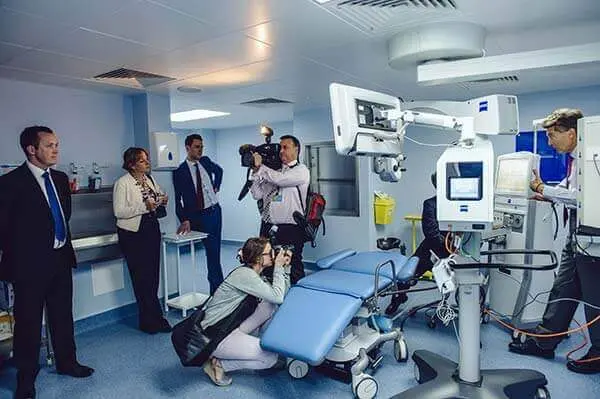
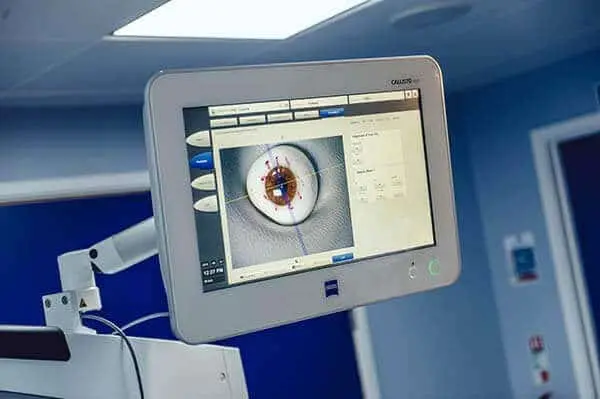
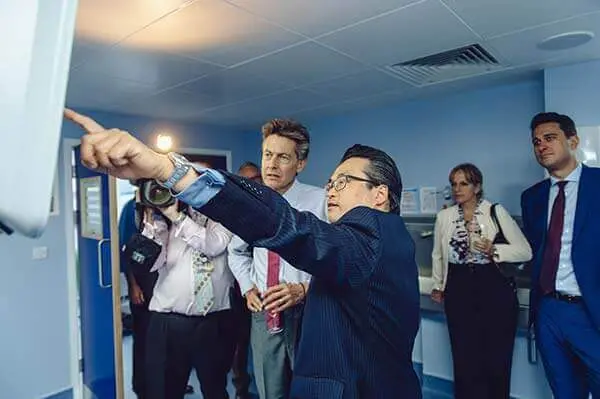
Wet macular degeneration
What is the Macula?
The retina serves as a delicate membrane akin to a photographic film, delicately covering the posterior part of the eye. Within this intricate structure, a plethora of specialised cells harmoniously collaborate to facilitate vision.
Notably, the macula, a highly significant region nestled within the retina, assumes responsibility for perceiving vibrant hues and intricate details, enabling us to truly appreciate the world around us.
What Treatment is Available?
The formation of an atypical network of blood vessels is heavily reliant on a signalling molecule called Vascular Endothelial Growth Factor (VEGF), which is responsible for the continuous growth and leakage of these vessels.
To counteract this, scientists have devised anti-VEGF agents, which are specialised humanised antibodies specifically designed to target VEGF. These agents function by obstructing the impact of VEGF on the abnormal network of blood vessels in individuals suffering from wet age-related macular degeneration (AMD). As a result, these vessels cease to leak and expand, effectively halting the progression of wet AMD.
To treat wet macular degeneration, intravitreal therapy (IVT) becomes necessary. This therapy involves the repetitive administration of anti-VEGF agents through injections into the vitreous cavity, which is the primary hollow space within the eye located at the back. This process aims to desiccate the macula, a crucial area affected by wet AMD, and mitigate its adverse effects.
Refractive Errors Eye Surgery
What are refractive errors?
In individuals with a refractive error, the optics of the eye (the cornea and lens) cannot focus light from distant objects on the retina.
Common refractive errors include:
Myopia: When the optics of the eye are too powerful for the length of the eyeball, one has myopia, or nearsightedness.
Hyperopia: When the optics of the eye are not powerful enough for the length of the eyeball, one has hyperopia, or farsightedness.
Astigmatism: when the optics of the eye are too powerful or too weak across one meridian. A person with astigmatism sees the lines of a particular orientation less clearly.
Presbyopia: when the flexibility of the lens declines due to age, leading to difficulty in near vision.
What is Refractive Lens Exchange Surgery?
Refractive Lens Exchange (RLE) surgery is a surgical procedure designed to eliminate lens-related issues by extracting the natural lens and substituting it with a meticulously crafted artificial lens implant.
The innovative lens implant is precisely tailored to address individual refractive errors, facilitating impeccable visual acuity at the preferred distance or distances, harmonising seamlessly with your unique lifestyle requirements.
Am I suitable for refractive lens exchange surgery?
As individuals reach the age of 45–55, they may begin to experience a decline in the crystalline lens’s ability to accommodate, resulting in a reduced capability to focus on objects at different distances.
During this period, refractive lens exchange surgery becomes a viable option to consider. Additionally, if one already suffers from significant refractive errors like myopia, hyperopia, or astigmatism, refractive lens exchange surgery can be truly transformative. It has the potential to liberate individuals from their dependence on glasses or contact lenses, enabling them to embrace a lifestyle that is virtually free from these visual aids.

Benefits of private eye surgery in Devon
Enhanced Treatment Availability
Private healthcare facilities offer a substantial advantage when compared to the extensive wait times often faced within the National Health Service (NHS). Within the NHS, patients frequently endure lengthy periods of six months or more before their vital surgical procedures can be scheduled.
On the other hand, our esteemed eye surgery centre, located in Devon, ensures prompt and efficient treatment, typically within a few weeks following the initial consultation. This ensures patients receive timely and essential care, eliminating any unnecessary delays.
The Significance of Prompt Treatment Access
The immediate availability of eye surgery is an urgent matter that cannot be overlooked for various compelling reasons. Foremost, the ability to access treatment without delay significantly diminishes the waiting period, which is crucial as extended waits can exacerbate a patient’s deteriorating eyesight, potentially impacting their overall quality of life. Mundane tasks like reading, driving, and recognising familiar faces can become increasingly burdensome and arduous.
Consequently, frustration ensues, leading to a greater reliance on others and a subsequent loss of personal independence. Moreover, untreated eye conditions can give rise to additional complications, such as persistent inflammation, glaucoma, or, in severe cases, complete loss of vision. Thus, the earlier patients can receive treatment, the lower the probability of complications arising, and the faster their normal visual capabilities can be restored.
Furthermore, expedient access to treatment also alleviates the anxiety and stress associated with waiting for a medical procedure, ultimately contributing to an enhanced state of mental well-being.
To embark on your journey towards private eye surgery in Devon, reach out to our dedicated team today. You have the option to either call our team at 01392 829436 or use our convenient online contact form.
